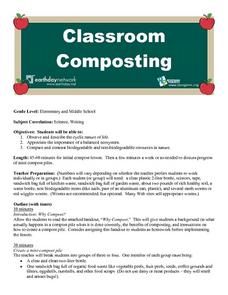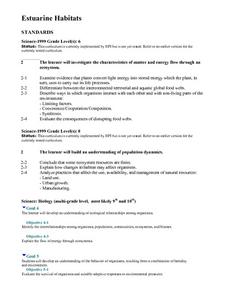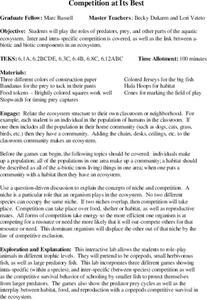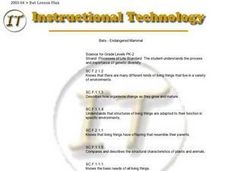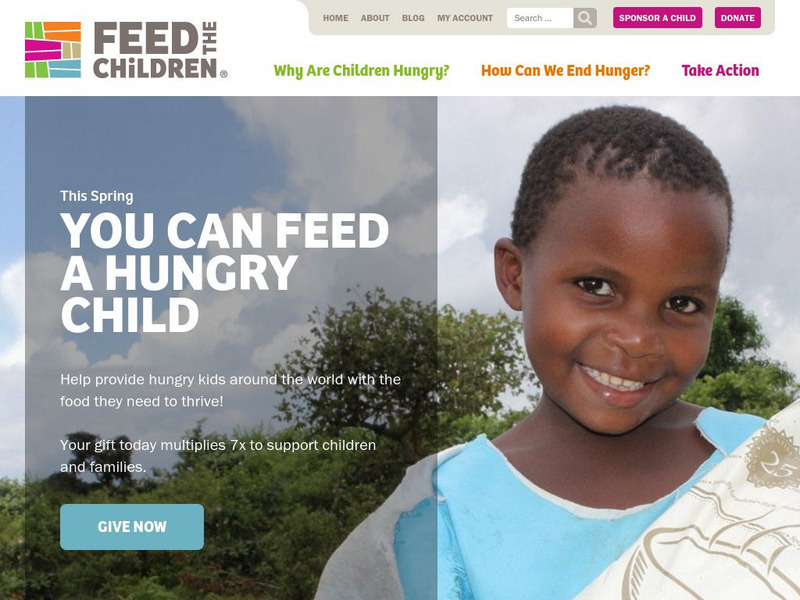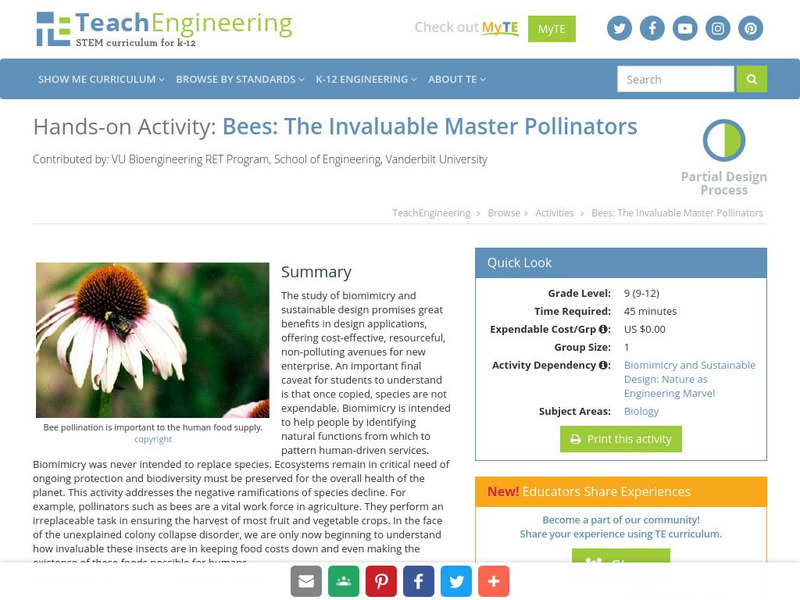Curated OER
Classroom Composting
Students discover the benefits of composting. They identify the steps of decomposition as well. They are read a book and discuss what items decompose.
Curated OER
What is a Plant?
In this plant learning exercise, students will review the origins and adaptations of plants including the alternation of generations. This learning exercise has 8 short answer, 6 fill in the blank, and 4 multiple choice questions.
Curated OER
Water Pollution
Students explore the causes of water pollution. In this environmental lesson, students conduct experiments with natural filtration systems.
Curated OER
Frontier Life Story
Pupils explore American frontier life. In this history lesson, students participate in a series of activities that challenge them to discover what pioneer life was really like.
Curated OER
Estuarine Habitats
Sixth graders study the important habitats, flora, fauna, and physical factors of coastal habitats. They compare the aquatic habitats to terrestrial habitats by researching and completing tables with the information.
Curated OER
"Habitats"
Students complete a unit of lessons on animals and animal conservation. They observe a square meter of ground outside the school, set up a model environment, analyze an owl pellet, grow bread mold, and explore various websites.
Curated OER
Community Foundations and You
Students list and explain the functions of the three sectors of the American economic system. They identify foundations as part of the third sector. They summarize the function and purpose of their local community foundation. They apply...
Curated OER
Compettion at its Best
Sixth graders role play predators, prey and other parts of the aquatic ecosystem. They show inter and intra-specific competition as well as the link between abiotic and biotic components in an ecosystem. Students play games about the...
Curated OER
Got Biodiversity?
Young scholars examine the concept of biodiversity. Using the internet, they complete small activities in which they work together. Using the information they collected, they create a class book, make murals and write in their journals.
Curated OER
Bats - Endangered Mammal
Students complete question sheet on Bats and research information using a list of websites provided by the teacher. They work with peers to complete a scavenger hunt worksheet about bats.
Curated OER
Do we Really Need Wild Nature
Students research challenges with which modern biotechnology confronts wild nature. Students collect articles that relate to biotechnology and the environment. Students prepare a collaborative answer to the question, "Do we really need...
Curated OER
Precious Water: Is it a Need, a Right, or a Commodity?
Students determine whether water is a need, a right, or a commodity. In this water lesson, students investigate land and water ecosystems through activities. Students also discover water as a resource and energy source as they observe...
Curated OER
A Day in the Life
Students use their research skills to investigate the behavior and characteristics of a rainforest animal. After creating a diary entry, they illustrate the habits and life cycle of the animal. They write the diary entry from the point...
Curated OER
Topic 6: Evaluating and Presenting Results
Young scholars construct spreadsheets from raw data. In this spreadsheet construction activity, students compile data into Microsoft Excel. Young scholars familiarize themselves with entering and presenting data in a spreadsheet.
Curated OER
Reflecting and Creating
Students evaluate the sustainability of an enterprise based on how well it contributes. In this sustainable agriculture lesson students build skills as they work together by using the Internet to research and develop their own...
Other
Do Something: 11 Facts About Organic Food
Learn about the differences between conventionally grown food and organic for both people and the environment. Includes important statistics about nutrition and pesticides.
WebMD
Web Md: Apples Again Top 'Dirty Dozen' List for Pesticides
Which foods are best when grown organic, and which ones are just as healthy for you when conventionally produced? This article lists types of fruits and vegetables from each category and explains why pesticide in food is an important...
Other
Food for the Poor
Non-profit organization that "provides food, housing, healthcare, education, water projects, mirco-enterprise development assistance and emergency relief to the poorest of the poor".
Other
Feed the Children
International humanitarian organization whose mission is "to provide desperately needed food and necessities to meet immediate needs".
Other
Counterpart International: Counterpart
Non-profit organization that focuses on humanitarian and relief assistance, education, healthcare, democracy and governance, food security, development, and more. Their mission is "giving people a voice in their own future through smart...
abcteach
Abcteach: Ponds
[Free Registration/Login Required] The abcteach directory contains sample pages from their pond unit for non-members. Handouts are in PDF format.
TeachEngineering
Teach Engineering: Bees Are Master Pollinators
The study of biomimicry and sustainable design promises great benefits in design application. It affords means by which to promote cost-effective, resourceful, non-polluting avenues for new enterprise. These "blueprints" have existed...
PBS
Nh Pbs: Nature Works: Ecosystems
How would you define an ecosystem? Check out this educational resource to learn more about the living and nonliving parts of different ecosystems.
